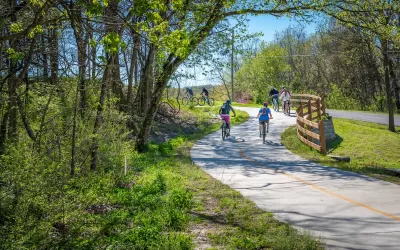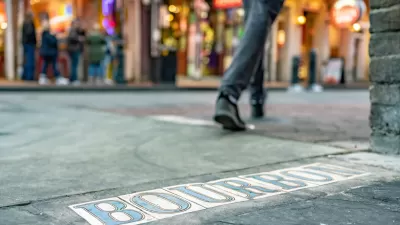Cities and states can access federal transportation funding by including trails in long-range transportation plans.

In a piece on Go Erie, Patrick Starr describes how Pennsylvania’s network of trails serves both recreational and functional purposes, offering a safe and comfortable way for people to walk or bike around cities that may not always have other safe pedestrian infrastructure.
“Trails are beloved as a safe and comfortable place to move, to see, smell, and experience the out-of-doors; to interact with family and friends; and for commuting or commerce,” Starr writes, pointing out that trails can be more than a “nice-to-have” community amenity. “Trails relieve this unmet demand for walkability and bikeability. If properly planned, trails can provide access to schools, workplaces, stores, main streets and parks.”
However, federal transportation funding only directs 1 percent of available funds to “transportation related” initiatives. Pennsylvania, where bike and walking trails are “wildly popular” with residents, has tapped these funds to build new trails, which are explicitly eligible for Carbon Reduction Program funding. “Clear patterns of increased use on some trails show that literally millions of bicycle commuters are using the trails for work trips — music to the ears of local officials dealing with rush-hour congestion.”
Starr suggests that states and cities can take advantage of transportation funding by including trails in their long-range transportation plans as critical — not purely recreational — components of an effective transportation system.
FULL STORY: Opinon: Pa. trails not just 'nice to have,' they offer transportation to work, school, commerce

Maui's Vacation Rental Debate Turns Ugly
Verbal attacks, misinformation campaigns and fistfights plague a high-stakes debate to convert thousands of vacation rentals into long-term housing.

Planetizen Federal Action Tracker
A weekly monitor of how Trump’s orders and actions are impacting planners and planning in America.

In Urban Planning, AI Prompting Could be the New Design Thinking
Creativity has long been key to great urban design. What if we see AI as our new creative partner?

King County Supportive Housing Program Offers Hope for Unhoused Residents
The county is taking a ‘Housing First’ approach that prioritizes getting people into housing, then offering wraparound supportive services.

Researchers Use AI to Get Clearer Picture of US Housing
Analysts are using artificial intelligence to supercharge their research by allowing them to comb through data faster. Though these AI tools can be error prone, they save time and housing researchers are optimistic about the future.

Making Shared Micromobility More Inclusive
Cities and shared mobility system operators can do more to include people with disabilities in planning and operations, per a new report.
Urban Design for Planners 1: Software Tools
This six-course series explores essential urban design concepts using open source software and equips planners with the tools they need to participate fully in the urban design process.
Planning for Universal Design
Learn the tools for implementing Universal Design in planning regulations.
planning NEXT
Appalachian Highlands Housing Partners
Mpact (founded as Rail~Volution)
City of Camden Redevelopment Agency
City of Astoria
City of Portland
City of Laramie





























